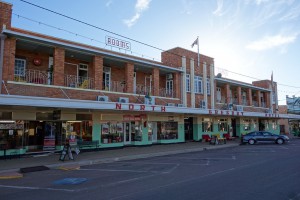
The Shire Council at the geographic heart of Queensland, Winton, has gotten its electricity supply into a lot of hot water. Literally.
The council on Thursday announced it had stuck a deal with LGIS, the state’s Local Government Infrastructure Services body, to draw heat to generate electricity from the Great Artesian Basin via a geothermal energy plant which it says could save it $15 million in energy costs.
The development of the alternative energy power plant sits in stark contrast to dozens of local governments that are at loggerheads with the coal seam gas industry which is keen on extracting the fuel as a lucrative overseas export.
Alternative and renewable energy initiatives by councils used to be primarily about showing environmental values. But in these cash strapped days, most local governments are pursuing projects that put savings straight into their bottom line by paying energy utilities a lot less.
According to Winton’s council and LGIS, the new geothermal plant once operational will not only power the council’s key buildings, but also has the potential to power all of the small town.
Winton Shire Council Mayor ‘Butch’ Lenton put the new geothermal plant’s payback period at less than seven years. He added the savings garnered will free-up sorely needed extra money for community projects.
Mayor Lenton said a massive drought, economic hardship, and a significant reduction in state and federal government funding for community services and assets had left his town hurting like a lot of Western Queensland.
“When a project comes along that can save our community millions we want to explore it thoroughly,’ he said.
The council’s chief executive, Tom Upton, who has to manage Winton’s limited finances is similarly steamed-up about the project’s potential, adding that other communities in the region would be excited by it finally going ahead.
“Geothermal energy is used across the world and here we are in Western Queensland we are sitting on one of the best sources of hot water in the world and not utilising its potential,” he said.
But with the fractious politics of water never far away, the council and LGIS (which is designing the geothermal plant) were at pains to stress that it will use water from already running bores to supply heat — as opposed to so-called ‘hot rocks’ technology that drills down deep to tap heat by getting closer to the earth’s core.
“This technology does not change the geological or chemical composition of water supplies in the region,” said LGIS chief executive Jari Ihalainen.
“The Geothermal energy plant to be deployed in Winton will simply use the hot water flowing from existing bores and convert this heat into a sustainable long-term energy source for the town.”
“Advancements in geothermal energy generation have opened up the possibility of utilising water temperatures as low as 70 degrees to generate power, which is a great opportunity for those Western Queensland councils located on the Great Artesian Basin,’ Mr Ihalainen said.
The council isn’t wasting any time plugging its mains into nature’s kettle either, with final design specifications due to be completed by the end of May 2015.
Local Government Association of Queensland President Margaret de Wit said geothermal energy could provide “massive savings for communities.”





Leave a Reply